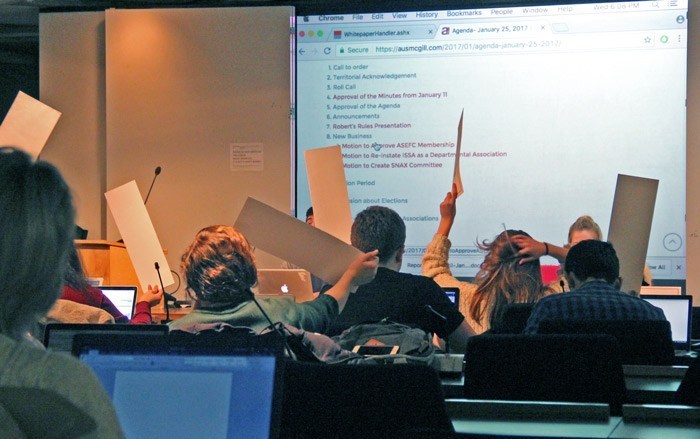The Arts Undergraduate Society (AUS) Legislative Council reconvened on Oct. 30 to discuss the Motion to Ratify the Interfaculty Involvement Restriction Policy (IRP). The policy aims to foster a safe environment by restricting individuals’ access to events if they have threatened the physical, mental, or emotional state of other individuals or groups involved.
While each faculty has their own version of the IRP, the interfaculty policy extends the policies to cover individuals accused of harmful actions from different faculties’ events.
Vice-President (VP) Social Kimberly Yang, who drafted the policy, spoke to the importance of its interfaculty component.
“Often times, a lot of the survivors I work with want the ban extended further than just their faculty,” Yang said. “With this new IRP, survivors won’t have to go through the investigative process four times to get interfaculty results, which is extremely taxing for a [sexual violence] survivor.”
Brent Jamsa, VP External of the Canadian Studies Association of Undergraduate Students (CSAUS), expressed concern over the lack of due process for appeals in the Interfaculty IRP. In response, Yang affirmed the need to pass the motion to begin investigative processes, and committed to adding an appeal process within the coming weeks.
While an amendment to include a sunset clause was proposed, which would specify a time period for the policy’s repeal, the council later gave unanimous consent for its withdrawal at the request of Jamsa. The motion then passed.
Afterwards, VP External Darshan Daryanani reported that the Motion Regarding Support of University Governance Reform was discussed at the Students’ Society of McGill University (SSMU) Legislative Council meeting on Oct. 24, which proposes the removal and addition of seats on council.
Alexandra Millar, VP External of the Bachelor of Arts and Science Integrative Council (BASiC), relayed BASiC’s unanimous dissatisfaction with the motion’s removal of an Arts and Science SSMU representative.
“Although we get a say in AUS and SUS, it is important that someone advocates for students who are doing both,” Millar said. “If [the motion] does go through, and there is a referendum, we will be campaigning [for a] no.”
Daryanani assured council that these concerns are being considered.
“It was mentioned in the [SSMU Legislative] council [meeting] that [there was some] fear that taking away a seat because of overrepresentation may result in no representation at all,” Daryanani said.
Jamal Tarrabain, AUS President, echoed the need to consider the diverse views of Arts & Science constituents.
“BASiC students do have unique voices that are separate from Arts [students] and Science [students],” Tarrabain said. “I want to implore everyone at AUS Legislative Council to take those factors into consideration when we are looking at removing some of these positions.”
Sound Bite
“Looking at the numbers of faculties is important, and ensuring that there is accurate representation is important; however, you also don’t want to enter the classification of tyranny of the majority,” Tarrabain said, in response to the proposed removal of the Arts and Science SSMU representative.
Flashback
After receiving live updates from the Engineering Undergraduate Society (EUS) throughout the meeting, Yang announced to the council that EUS passed the Interfaculty IRP during their meeting, marking the motion successful in two out of four of the undergraduate societies so far.







